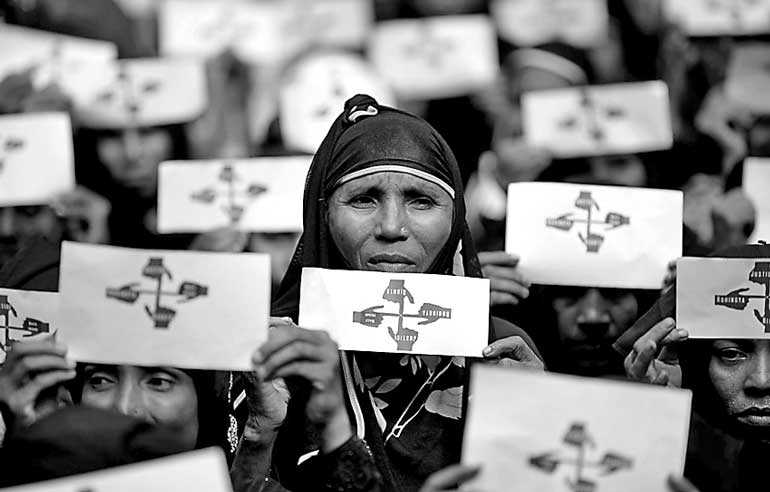Monday Feb 23, 2026
Monday Feb 23, 2026
Saturday, 1 December 2018 00:30 - - {{hitsCtrl.values.hits}}

Rohingya refugee women hold placards as they take part in a protest at the Kutupalong refugee camp to mark the one-year anniversary of their exodus in Cox’s Bazar, Bangladesh, 25 August – Reuters
WASHINGTON (Reuters): A human rights law group contracted by the State Department to interview refugees as part of an investigation into atrocities against Rohingya Muslims in Myanmar has found that there is a reasonable basis to conclude that genocide was committed – even though the US government stopped short of saying so.
A report due to be released on Monday by the Washington-based Public International Law and Policy Group (PILPG) will also say there was a reasonable basis to conclude that the Myanmar military committed crimes against humanity and war crimes, as well as genocide. A US State Department report released in September, which relied on PILPG research, found that Myanmar’s military waged a “well-planned and coordinated” campaign of mass killings, gang rapes and other atrocities against the Rohingya.
But it stopped short of describing the crackdown as genocide or crimes against humanity, an issue that US officials said was the subject of fierce internal debate that delayed the report’s rollout for nearly a month. A declaration of genocide by the US government, which has only gone as far as labeling the crackdown “ethnic cleansing,” could have legal implications of committing Washington to stronger punitive measures against Myanmar. This has made some in the Trump administration wary of issuing such an assessment.
In an advisory on Thursday announcing the planned release of the legal analysis of its investigation, PILPG said it would reveal that “there is a reasonable basis to conclude that war crimes, crimes against humanity, and genocide were committed against the Rohingya population.”
PILPG based its report on more than 1,000 interviews with Rohingya refugees who fled to Bangladesh. The group said its mission was conducted in March and April “to provide an accurate accounting of the patterns of abuse and atrocity crimes.”